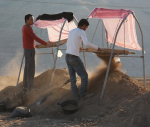You are here
I supported Oslo because it shattered a taboo
Sep 18,2023 - Last updated at Sep 18,2023
Despite being an eyewitness to the unravelling of the Oslo Accords, I am not at all embarrassed to say that I supported Oslo.
Thirty years ago, news of an Israeli-PLO agreement hit Washington like an earthquake, shattering taboos and upending what had been considered political constants. I was part of the group of hundreds of Arab Americans and American Jews who were there on the White House lawn to witness the signing ceremony. After the signing, when president Clinton nudged Israeli prime minister Yitzhak Rabin pressing him to accept PLO Chairman Yasser Arafat’s outstretched hand, an audible gasp could be heard from the assembled — followed by applause and handshakes and embracing throughout the audience. Something big had just happened, and it was exciting. But because we were entering uncharted waters, hopefulness was mixed with uncertainty.
To those who were not of age in the years before September 13, 1993, the handshake may not have seemed a big deal. But for the generation who grew up under the cloud of anti-Palestinian bigotry and Arab American exclusion, it was enormous.
In 1975, as part of the Sinai Disengagement Agreement, Israel had secured a secret pledge from the US that it would never have to talk to the PLO. Commenting on this, then Israeli prime minister Shamir said that his aversion to the PLO was not based on what they did, but what they stood for, Palestinian national rights. Further elaborating, in 1985, speaking in Washington, then minister of defence Yitzhak Rabin declared that talking to the PLO was unacceptable because “Whoever agrees to talk to the PLO means he accepts in principle the creation of a Palestinian state between Israel and Jordan.” And this Israel could not accept.
In the US, pro-Israel groups did their best to broaden this rejection of all things Palestinian. The State Department forcefully implemented a “no-talk” policy. Legislation was passed declaring the PLO a terrorist group. When I attempted to modify the 1988 Democratic Party platform to include very modest language affirming the rights of the Palestinian people, I was told if that p word even appears in the platform, all hell will break loose.
Not satisfied with demonising the Palestinian cause and their organisations, pro-Israel groups imposed a religious-like taboo on Palestinian leaders. It was not enough to secure restrictions banning US politicians from meeting with Arafat or other top PLO leaders, physical contact was seen as making a politician unclean. Campaigns were run against congressmen who met with Arafat denouncing them for shaking Arafat’s hand.
And so here we were, on that September day, watching Israel not only talking to and signing an agreement with the PLO, but now shaking hands with the person whom they had spent decades vilifying.
More than anything, this handshake, which out of context may seem to some to have been an inconsequential act, was the shattering of a taboo that pro-Israel groups had worked decades to establish and which they had used to torment or destroy the political careers of those who risked defying them.
Oslo also opened the White House doors to Arab Americans, normalising for the first time our relationship with government. The community was given the respect it deserved and had for too long been denied. And while our foes continued to oppose us and made efforts to exclude us, the doors, once opened, could not easily be closed.
Thirty years later, those breakthroughs may seem to pale in the face of the enormity of the sufferings still endured by Palestinians. But seen in the American political context, they were important and not to dismissed.
In the end, Oslo did fail. And while the fingers of blame can point in many directions, ultimately, as I will discuss in my next column, it was the refusal of the US to assume its responsibility as guarantor of the process that is the main reason for the disaster the Israeli-Palestinian arena has become.
The writer is president of the Washington-based Arab American Institute














